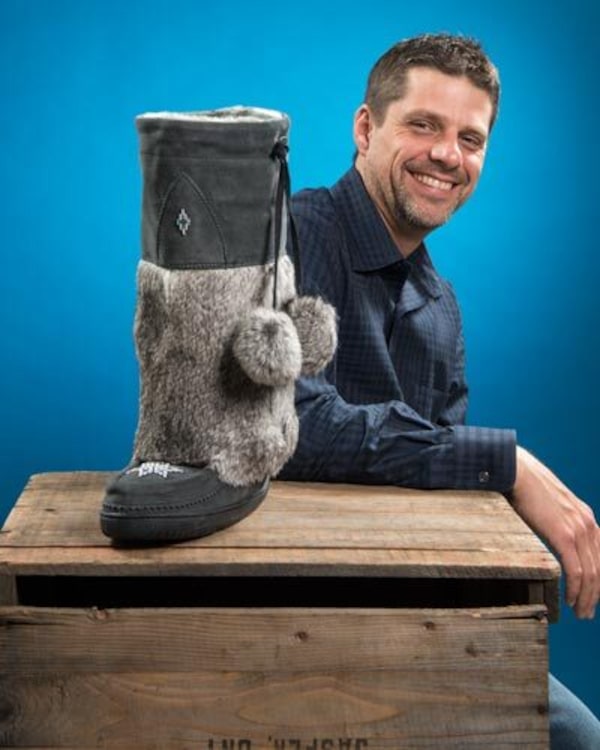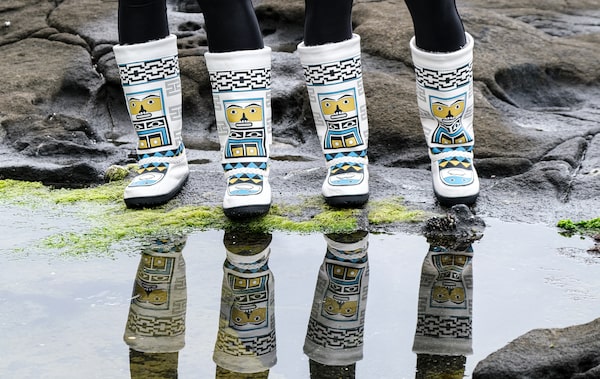
Sean McCormick, founder of Manitobah Mukluks.courtesy Manitobah Mukluks
Growing up in northern Manitoba, Sean McCormick wore mukluks.
He didn’t know it at the time, but these boots, designed and worn by Indigenous people in the world’s coldest climates, would inspire one of the biggest Indigenous brands in Canada.
After working in a tannery in high school and establishing a trading post where Indigenous artisans traded their handmade mukluks for much-needed leather, skins, and furs, McCormick considered manufacturing the boots himself.
“It just occurred to me that there was maybe a business there,” he says.
After taking an entrepreneurship course for Indigenous youth, McCormick launched a mukluk brand under the name Fleeceline in 1997, eventually rebranding in 2008 as Manitobah Mukluks, or Manitobah for short.
Initially, mukluks were sold in Jasper and Lake Louise tourist shops as souvenirs. But a few years into the business, McCormick received an order from a shop in England. Shortly after, Kate Moss was photographed wearing a pair of the boots.
It was a turning point. The company went from manufacturing 1,000 mukluks per year to 1,000 per week. Globally, public perceptions changed as people began seeing mukluks as footwear rather than souvenirs.
As the company grew, so did its need to develop an international supply chain. When McCormick launched the company, it was 100 per cent Indigenous staffed and sourced. As it expanded, he wanted to ensure that it stayed authentic to its origins.
“An Indigenous entrepreneur who grew up wearing mukluks and sells them to the broader community – is that appropriation?” McCormick wondered. “It is if you don’t do it right, whether you’re Indigenous or not.”
For McCormick, part of “doing it right” is acknowledging that mukluks are owned by the broader Indigenous community.
“We didn’t invent mukluks. There was no one individually I could get permission from or write a cheque to,” he says.
Instead, McCormick turned to his community – the urban Indigenous community in Winnipeg – to seek guidance on selling mukluks to a predominantly non-Indigenous customer base. The community gave him their blessings through Elders and other leaders – for this, McCormick says he is forever indebted.
One of the ways McCormick shows continued appreciation and respect for their support is by embedding social and community impacts directly into the company’s operations. He says Manitobah has been practising Indigenous-first sourcing and hiring policies “before DEI [diversity, equity and inclusion] was even a term.”
One of the company’s impact initiatives is the Manitobah Mukluks Storyboot School, a free program that provides arts-based courses to Indigenous youth to help preserve Indigenous artisan crafting techniques, including shoemaking.
Manitobah hosts an Indigenous marketplace on its website, where Indigenous artists can sell their products worldwide and receive 100 per cent of the profits.
The company also works closely with Indigenous artisans on its new designs.

Tiffany Vanderhoop’s mukluk design. She said she felt like she 'won the lottery' when Manitobah reached out to collaborate.courtesy @theoriginalabaloneshell - Grace Jones
Tiffany Vanderhoop, whose Haida name is S’idluujaa, felt like she “won the lottery” when Manitobah reached out to collaborate on a mukluk design.
Over a decade earlier, Vanderhoop saved up to buy herself a pair of Manitobah’s mukluks for Christmas.
“I’ve always admired Manitobah for putting Indigenous artists at the forefront of their brand and for providing economic growth for Indigenous commerce, families, and communities,” she says.
Vanderhoop, an artist and designer who comes from a long line of weavers, collaborated with the company on a design for hats, scarves, mittens and mukluks. Vanderhoop physically drew the mukluk design on paper, cutting and pasting it until it was just right – a lengthy process that involved working with Manitobah’s in-house designer, who digitized it so it could appear on a mukluk.
According to McCormick, this authenticity in honouring Indigenous tradition, art and community has been key to fostering brand growth. Manitobah, was on the 2014 Profit 500 list of fastest-growing companies in Canada, posting nearly 300 per cent growth between 2008 and 2013. Now, it reaches customers in over 150 countries. Its footwear, including mukluks, moccasins and slippers, is stocked in around 1,000 retailers globally, ranging from large retailers like REI to small tourist shops, generating tens of millions of dollars per year.
In 2021, McCormick connected with Endeavour Capital; given their strong alignment with Manitobah’s social mission and vision, Endeavour invested in the company to help further his vision and support the brand’s expansion.
McCormick has since stepped down as CEO, retaining a substantial ownership stake in Manitobah while also serving as an active board member and advisor.
But even this approximation of retirement left the founder “really bored, really quickly.”
Now a partner at Raven Indigenous Capital Partners, McCormick supports other Indigenous entrepreneurs in scaling their companies and striving for economic sovereignty.
“Indigenous entrepreneurs all want something better for themselves, but more importantly, they all want something better for their communities,” he says.
One in a regular series of stories. To read more, visit our Indigenous Enterprises section. If you have suggestions for future stories, reach out to IE@globeandmail.com